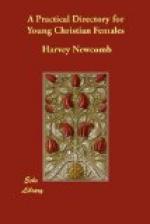But the faithfulness of God to his promises is not confined to Scripture times. Although the time of miracles has passed, yet every age of the church has furnished examples of the faithfulness of God in hearing the prayers of his children. But these are so numerous that it is difficult to make selections from them. However, I will mention a few. When the Arians, who denied the divinity of Christ, were about to triumph, the Bishop of Constantinople, and one of his ministers, spent a whole night in prayer. The next day, Arius, the leader of his party, was suddenly cut off, by a violent and distressing disease. This prevented the threatened danger. Augustine was a wild youth, sunk in vice, and a violent opposer of religion. His mother persevered in prayer for him nine years, when he was converted, and became the most eminent minister of his age. The life of Francke exhibits the most striking and signal answers to prayer. His orphan house was literally built up and sustained by prayer. If you have not already read this work, I would advise you to obtain it. It is a great help to weak faith. Mr. West (afterwards Dr. West) became pastor of the Congregational church in Stockbridge, Massachusetts, while destitute of vital piety. Two pious females often lamented to each other that they got no spiritual food from his preaching. At length, they agreed to meet once a week, to pray for his conversion. They continued this for some time, under much discouragement. But, although the Lord tried their faith, yet he never suffered them both to be discouraged at the same time. At length, their prayers were heard. There was a sudden and remarkable change in his preaching. “What is this?” said one of them. “God is the hearer of prayer,” replied the other. The Spirit of God had led Mr. West to see that he was a blind leader of the blind. He was converted, and changed his cold morality for the cross of Christ, as the basis of his sermons. A pious slave in Newport, Rhode Island, was allowed by his master to labor for his own profit whatever time he could gain by extra diligence. He laid up all the money he earned in this way, for the purpose of purchasing the freedom of himself and family. But, when some of his Christian friends heard what he was doing, they advised him to spend his gained time in fasting and prayer. Accordingly, the next day that he gained, he set apart for this purpose. Before the close of the day, his master sent for him, and gave him a written certificate of his freedom. This slave’s name was Newport Gardner. He was a man of ardent piety; and in 1825, he was ordained deacon of a church of colored people, who went out from Boston to Liberia. Instances of surprising answers to prayer, no less striking than these, are continually occurring in the revivals of religion of the present day.
With the evidence here presented, who can doubt that God hears and answers prayer? But, the objection arises, “If this doctrine be really true, why is it that Christians offer up so many prayers without receiving answers?” The apostle James gives some explanation of this difficulty: “Ye ask and receive not, because ye ask amiss.” It becomes us, then, seriously and diligently to inquire how we may ask aright so as to secure the blessings so largely promised in answer to prayer. In relation to this subject, there are several things to be observed:




